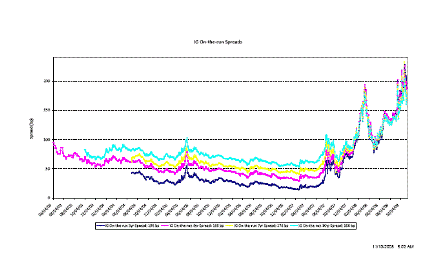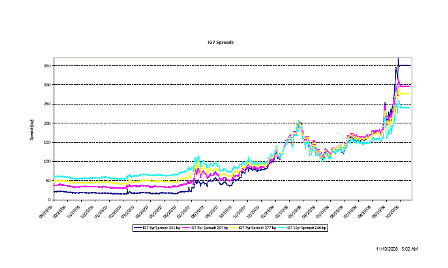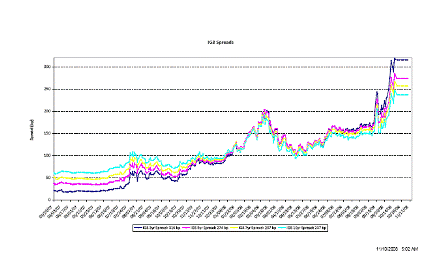[Skip to the end]
(email exchange)
>
> On Fri, Nov 7, 2008 at 11:12 PM, wrote:
>
> Geithner’s very smart,
>
Then why couldn’t he even hit his Fed funds target? When I asked operations people at the NY Fed why they can’t just make a one basis point market around the target they said that would mean continuous ‘intervention’ all day which would be a lot of ‘work.’ They said they only wanted to intervene once in the late morning so were trying to ‘guess’ the right amount to intervene then. This is a ridiculous way to run policy!
It took them three tries on paying interest on reserves to get the ‘right’ level which was the obvious- set it at the Fed funds target.
They are the ones passing along the swap line requests and must know or should know the likely consequences of this madness and that the FOMC doesn’t fathom what’s going on, as part what could be the biggest blunder in ‘monetary policy history.’ How does the Fed even get to loan 30 billion to Mexico secured only by pesos without Congressional discussion of any kind? The total advanced is now up to some $580 billion, with the biggest chunk to the ECB, completely under any radar screen.
>
> But at a time when backbone might be nice along with brains, he’s not
> exactly worry-free. Or perhaps I should say that backbone would have
> been nice along with his brains at the New York Fed: I think he saw all
> too clearly the disaster in the making which hugely leveraged Wall
> Street balance sheets represented, but was way too go along to get
> along to put his foot down.
>
Worse. He was part of the decisions to not give ‘depositors’ their funds back in the Lehman failure, and part of the ‘lie’ that the Fed loaned Bear $31 billion when in fact it bought the securities.
>
> His testimony during the Bear hearings are a model of velvet-gloved
> disingenuousness, although in that it differs little from the testimony of
> his fellow savior of the banking system, Dr. Bernanke.
>
Exactly. I’ll give them the benefit of the doubt as the overwhelming evidence is they didn’t comprehend the subject matter.
>
> As you know, I’m all for Corzine, of the three rumored frontrunners.
>
The least worst. Remember his ‘whispers’ caught by mics during an address with the black clergy in NJ?
Also, I met with him a couple of years back to discuss how to question then Chairman Greenspan. He agreed with what I was saying but chose not to do it for reasons unknown. I subsequently wrote ‘Interview with the Chairman’ as a guide to any congressman questioning the Fed chairman.
An Interview with the Chairman
At best he’s seriously ‘intellectually dishonest.’
Also note the TARP belonged in the Fed, not Treasury. The Fed ‘spending’ is monetary as it routinely buys securities/financial assets (like the $31 billion from Bear), while treasury federal spending is ‘fiscal’ like paying the soldiers and the postal workers, etc. If they put the TARP where it belonged it would not be part of the ‘budget’ and the spending not accounted for as part of the ‘deficit.’ I’m not so cynical to think the reason they gave it to Treasury was to allow it to show up as increased deficit spending and hopefully put a cap on ‘social programs’ to a misguided Congress. Instead I’d just call it more evidence of ignorance of monetary operations and public accounting.
Just one more thing- the Obama talk yesterday shows a continuing ‘upside down’ approach to the economic ‘problem.’ Seems to me both GM and the Banks, for example, need a population that can afford to buy cars and make payments (aka aggregate demand), which all the ‘investment loans’ and ‘financial injections’ don’t address at all.
Government always has a choice of providing additional public goods and/or supporting private consumption oriented output. For me the move to support private sector output such as cars and financial services would best be done with a ‘payroll tax holiday’ where the treasury makes all the fiscal payments which would immediately (and progressively) give working people an immediate, ongoing, and substantial increase in income to facilitate the payment of mortgages and the buying of cars. (If they don’t want to buy cars for non financial reasons so be it- let the industry shut down.) If instead government wants more public goods, it can facilitate the various public projects it’s been discussing to increase the output of public goods, and not necessarily for the further purpose of increasing the real output of private sector goods (always meaning to include services for both sectors, of course). When using up real excess capacity we can also have both, but at the macro level there is a real choice between public and private goods and services.
While it’s far to early to lose hope, all I saw with the first press conference yesterday was what looked like an undistinguished senator with no specific ideas as to what to do making a ‘sing songy’ presentation with very odd ‘mispeaks’ such as he talked to the living ex presidents, and something like he had a good transition team because it was given a lot of thought, etc. And marching up reps of corporate America to do nothing but stand in line behind him was to me an insulting piece of showmanship. The message was this is going to take time- he needs to talk to a lot of advisors, try to grasp the issues, and then decide on what to do. And with both deficit hawks and doves in his ‘inner circle’ and seemingly no personal conviction either way there’s no telling what will happen or when it will happen. What’s also clear ‘change’ so far is change back to the fossils of past Dem admins and the introduction of Chicago Dem politics to the federal level. And his two expressed policy statements- about China and currency manipulation October 24 and yesterday’s statement that Iran will not be permitted nuclear weapons- are both continuations of the Bush regime.
Yes, even the worst case is still better than what we had, or might have had, so this is not to say he wasn’t the best choice.
I’d better stop here!
All the best!
Warren
[top]






